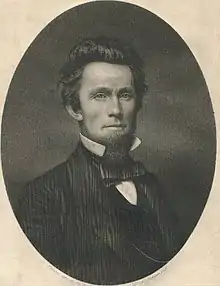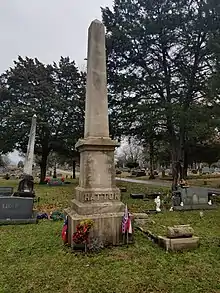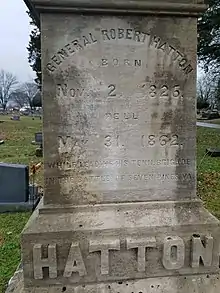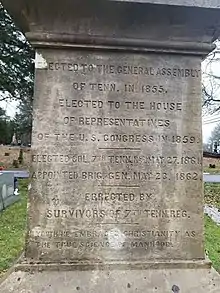Robert H. Hatton
Robert Hopkins Hatton (November 2, 1826 – May 31, 1862) was a lawyer and politician from Tennessee. He was a state legislator and US Representative, and a Confederate general during the American Civil War.
Robert H. Hatton | |
|---|---|
.jpg.webp) | |
| Member of the U.S. House of Representatives from Tennessee's 5th district | |
| In office March 4, 1859 – March 3, 1861 | |
| Preceded by | Charles Ready |
| Succeeded by | William B. Campbell (1866) |
| Member of the Tennessee House of Representatives from Wilson County | |
| In office October 1, 1855 – October 5, 1857 | |
| Personal details | |
| Born | Robert Hopkins Hatton November 2, 1826 Steubenville, Ohio |
| Died | May 31, 1862 (aged 35) Henrico County, Virginia |
| Political party | Opposition Whig |
| Alma mater | Cumberland University |
| Military service | |
| Allegiance | |
| Branch/service | Confederate States Army |
| Years of service | 1861–1862 |
| Rank | Brigadier General (not confirmed) |
| Battles/wars | American Civil War |

Biography
Hatton was born in either Steubenville[1][2] or Youngstown, Ohio[3][4] (sources differ). His father, Rev. Robert Clopton Hatton, was a Methodist preacher.[5] Early in his life, in 1842, his family moved to Tennessee.[6] He graduated from Cumberland University, then studied law there at Cumberland School of Law. He established a successful practice in Lebanon, Tennessee, after passing the bar exam in 1850[7] He joined the Whig Party and was elected to the State Legislature in 1855. He unsuccessfully ran for governor in 1857. In 1858, he was elected US Representative from the 5th District as an Opposition Party candidate (the Whig party had collapsed). In the Thirty-sixth Congress, he served as chairman of the Committee on Expenditures in the Department of the Navy.
Hatton believed that the Union should be preserved and initially opposed secession.[8] However, after President Lincoln called for volunteers to put down rebellion,[9] Hatton became a secessionist. He formed a Confederate military unit, the Lebanon Blues, which became a part of the 7th Tennessee Infantry. Hatton was soon elected as colonel of the regiment, which was sent to western Virginia in July 1861.
In 1862, Hatton and his men were ordered to the Richmond area to oppose the Federal drive on the Confederate capital. During the resulting Peninsula Campaign, Hatton served with distinction, and on May 23, 1862, he was promoted to brigadier general of the 4th Brigade, 1st Division, Army of Northern Virginia; this appointment was not confirmed by the Confederate Congress.[10] Just eight days later, he was shot in the head and killed while leading his Tennessee Brigade at the Battle of Fair Oaks.[11]
His body was returned to Tennessee for burial, but because Middle Tennessee was occupied by Federal troops, he was temporarily buried at Knoxville. On March 23, 1866, he was reburied in Lebanon's Cedar Grove Cemetery. A statue of him was erected in Lebanon's town square in 1912.[11]



Honors
The Robert H. Hatton Camp #723 of the Sons of Confederate Veterans is named in his memory and honor.
References
- Biographical Directory of the United States Congress: Hatton, Robert Hopkins, (1826-1862)
- Tucker, Spencer C. American Civil War: The definitive encyclopedia and document collection. Santa Barbara, Ca.: ABC-CLIO, 2013.
- Drake, James Vaulx. Life of General Robert Hatton: Including His Most Important Public Speeches. Nashville, Tenn.: Marshall & Bruce, 1867.
- The Twentieth Century Biographical Dictionary of Notable Americans, edited by Rossiter Johnson and John Howard Brown. Boston, The Biographical Society, 1904.
- Caldwell, Joshua William. Sketches of the Bench and Bar of Tennessee, Knoxville, Tenn.: Ogden Brothers Printers, 1898, p. 257.
- Bishop, Randy. Civil War Generals of Tennessee. Gretna, La., Pelican Publishing, 2013
- "Congress slaveowners", The Washington Post, 2022-01-13, retrieved 2022-07-04
- Charles M. Cummings. Robert Hopkins Hatton: Reluctant Rebel, Tennessee Historical Quarterly, Vol. 23, No. 2 (June, 1964), pp. 169-181. JSTOR 42621681
- "Proclamation of President Abraham Lincoln", dated April 15, 1861
- Eicher, John H., and David J. Eicher. Civil War High Commands. Stanford: Stanford University Press, 2001, p. 600.
- "Lebanon, Tennessee: A Tour of Our City" (PDF). Lebanon/Wilson County Chamber of Commerce. Archived from the original (PDF) on June 15, 2007. Retrieved February 5, 2007.
Further reading
- Cummings, Charles M., "Robert Hopkins Hatton: Reluctant Rebel." Tennessee Historical Quarterly Number 23, June 1964, pages 169-81.
- Eicher, John H., and David J. Eicher, Civil War High Commands. Stanford: Stanford University Press, 2001. ISBN 978-0-8047-3641-1.
- Sifakis, Stewart. Who Was Who in the Civil War. New York: Facts On File, 1988. ISBN 978-0-8160-1055-4.
- Warner, Ezra J. Generals in Gray: Lives of the Confederate Commanders. Baton Rouge: Louisiana State University Press, 1959. ISBN 978-0-8071-0823-9.
External links
- United States Congress. "Robert H. Hatton (id: H000349)". Biographical Directory of the United States Congress. Retrieved on 2009-05-03
- Photo Gallery of Hatton at the Wayback Machine (archived February 8, 2008)
{{|url=https://www.loc.gov/item/2002711381/ |title=Robert Hopkins Hatton, 1827-1862}}